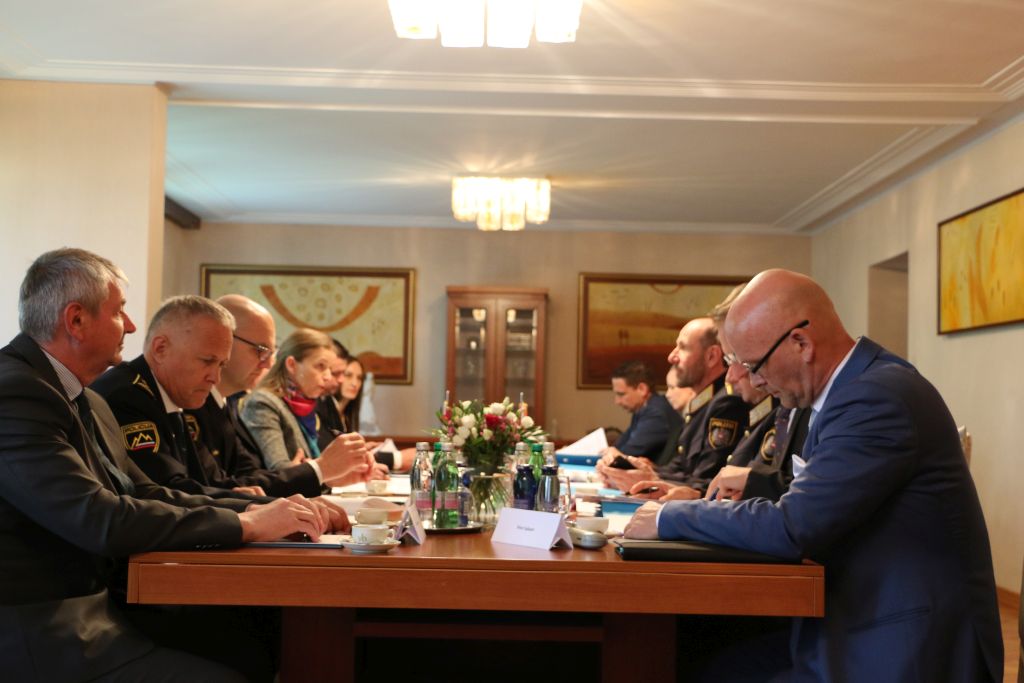Acting Director General of the Police, Senad Jušić, met with his Austrian counterpart, Director General for Public Security Dr Franz Ruf, in Bled today. While the main topic of their talks was bilateral cooperation between the police forces of the two countries, they also discussed the recently intensified joint activities in the control of the shared border and the migration situation.

Mr Jušić and Dr Ruf expressed their satisfaction that police cooperation has traditionally been very good, with Mr Jušić also voicing his regret at Austria's decision to prolong control at the common border one more time and calling for the checks at the Slovenian-Austrian border to be lifted as soon as possible.
Cooperation between Slovenian and Austrian police officers is effectively conducted through the two Police Cooperation Centres Dolga vas and Vrata Megvarje, as well as within the framework of Interpol, Europol, Sirene, the Salzburg Forum and at the level of the Council of the European Union working groups. The deployment of the Slovenian Police Attaché in Vienna has undoubtedly contributed to the close relations, and in March the cooperation between the two countries was further strengthened by joint activities in the form of mixed patrols and tightened controls.

In addition to Senad Jušić, Acting Director General of the Police, the Slovenian delegation consisted of Jože Senica, Assistant Director General of the Police, Vladimir Pocek, Slovenian Police Attaché in Vienna, Marko Gašperlin, Director of the Uniformed Police Directorate, Melita Močnik, Director of the Kranj Police Directorate, Donald Rus, Director of the Maribor Police Directorate, and Jana Ristanović, representative of the European Affairs and International Cooperation Service.
The Austrian delegation included Dr Franz Ruf, Director General for Public Security, Günter Wendt from the Department of Border Affairs and Foreigners of Provincial Police Directorates, Günter Schnittler, Head of the Integrated Border Management Department, Dr Michaela Kohlweiß, Director of the Carinthian Provincial Police, Gerald Ortner, Director of the Styrian Provincial Police, Tanja Grahammer and Martin Nief from the Directorate General for Public Security, and Peter Eglauer, Zagreb-based liaison officer, responsible for Slovenia.

Joint activities in internal border control
Acting Director-General of the Police Senad Jušić highlighted the importance of the Schengen area as one of the most important achievements of the EU, which must be preserved. Slovenia's position is that checks at the EU's internal borders should only be introduced as a measure of last resort, they should be proportionate to the identified threat, and above all temporary and lifted as soon as possible.
In this context, Jušić regretted Austria’s decision to further extend border checks: "We have already expressed our concerns on several occasions and have demonstrated, on the basis of concrete statistical data, that this is a disproportionate measure." The Slovenian police have recorded no increase in illegal crossings of the border between the two countries, and the number of returns at the common border has been negligible. Indeed, from 1 January to 20 April this year, the Slovenian police took back 14 persons from the Austrian police (4 of them Slovenian nationals), while 23 persons were taken back in the same period in 2022 (4 of them Slovenian nationals). A total of 58 persons were taken back from Austria in 2022, 70 in 2021, and 176 in 2020. In fact, most migration flows from the Western Balkans to Austria pass through member states other than Slovenia, as confirmed by data from EU agencies. "Therefore, border checks should be replaced by other measures, such as mixed patrols, reinforced control and other joint actions and exercises based on risk assessment."
The two police chiefs agreed that the mixed patrols and other joint actions carried out in March and April in the areas of Kranj, Celje, Maribor and Murska Sobota Police Directorates were conducted smoothly and efficiently. These methods have proved to be effective and do not put undue strain on the border population, travellers or the economy. The two police forces will continue their enhanced cooperation through joint patrols and other joint activities.
Further, Senad Jušić explained that migration flows depend primarily on the developments in the countries of origin and cannot be effectively managed at internal borders only. He added: "This is why we need to strengthen the surveillance of the EU external border; this is the only way to effectively tackle irregular migration and clamp down on criminal groups. In addition, cooperation with transit countries in our region should be promoted, which is the very aim of the Brdo process, a long-standing platform addressing current challenges in the area of internal security and migration."
Exemplary bilateral cooperation in other areas
The bilateral cooperation with Austria has been highly professional and amicable for several years. Collaboration between the Slovenian police and Austrian law enforcement authorities has legal basis in several international treaties, agreements and intergovernmental arrangements.
Slovenian and Austrian police work together in prevention and detection of crime (i.e. the fight against international criminal organisations trafficking in illicit drugs and human beings, in investigating grand larcenies, thefts of vehicles and robberies, economic and environmental crime, corruption in sports, homicides and sexual offences, etc.) We exchange information on travel of sports teams and fans to international sports events and have a years-long excellent cooperation in the framework of the Central European Police Academy’s (CEPA) training for police officers and criminal investigators.
A more recent example of good cooperation between the countries was the assistance of the Austrian helicopter police unit in fighting the wildfires in Kras in August 2022, for which the leadership of Slovenian police personally thanked the Austrian colleague Dr Franz Ruf in autumn last year.


